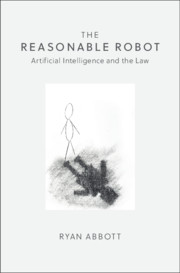Book contents
- The Reasonable Robot
- The Reasonable Robot
- Copyright page
- Dedication
- Contents
- Introduction: Artificial Intelligence and the Law
- 1 Understanding Artificial Intelligence
- 2 Should Artificial Intelligence Pay Taxes?
- 3 Reasonable Robots
- 4 Artificial Inventors
- 5 Everything Is Obvious
- 6 Punishing Artificial Intelligence
- 7 Alternative Perspectives on AI Legal Neutrality
- Third-Party Materials
- Notes
- Index
5 - Everything Is Obvious
Published online by Cambridge University Press: 15 June 2020
- The Reasonable Robot
- The Reasonable Robot
- Copyright page
- Dedication
- Contents
- Introduction: Artificial Intelligence and the Law
- 1 Understanding Artificial Intelligence
- 2 Should Artificial Intelligence Pay Taxes?
- 3 Reasonable Robots
- 4 Artificial Inventors
- 5 Everything Is Obvious
- 6 Punishing Artificial Intelligence
- 7 Alternative Perspectives on AI Legal Neutrality
- Third-Party Materials
- Notes
- Index
Summary
The impact of artificial inventors is only starting to be felt, but AI’s rapid improvement means that it may soon outdo people at solving problems in certain areas. This should revolutionize not only research and development but also patent law. The most important requirement to being granted a patent is that an invention must be nonobvious to a hypothetical skilled person who represents an average researcher. As AI increasingly augments average researchers, this should make them more knowledgeable and sophisticated. In turn, this should raise the bar to patentability. Once inventive AI moves from augmenting to automating average researchers, it should directly represent the skilled person in obviousness determinations. As inventive AI continues to improve, this should continue to raise the bar to patentability, eventually rendering innovative activities obvious. To a superintelligent AI, everything will be obvious.
Keywords
Information
- Type
- Chapter
- Information
- The Reasonable RobotArtificial Intelligence and the Law, pp. 92 - 110Publisher: Cambridge University PressPrint publication year: 2020
Accessibility standard: Unknown
Why this information is here
This section outlines the accessibility features of this content - including support for screen readers, full keyboard navigation and high-contrast display options. This may not be relevant for you.Accessibility Information
- 1
- Cited by
